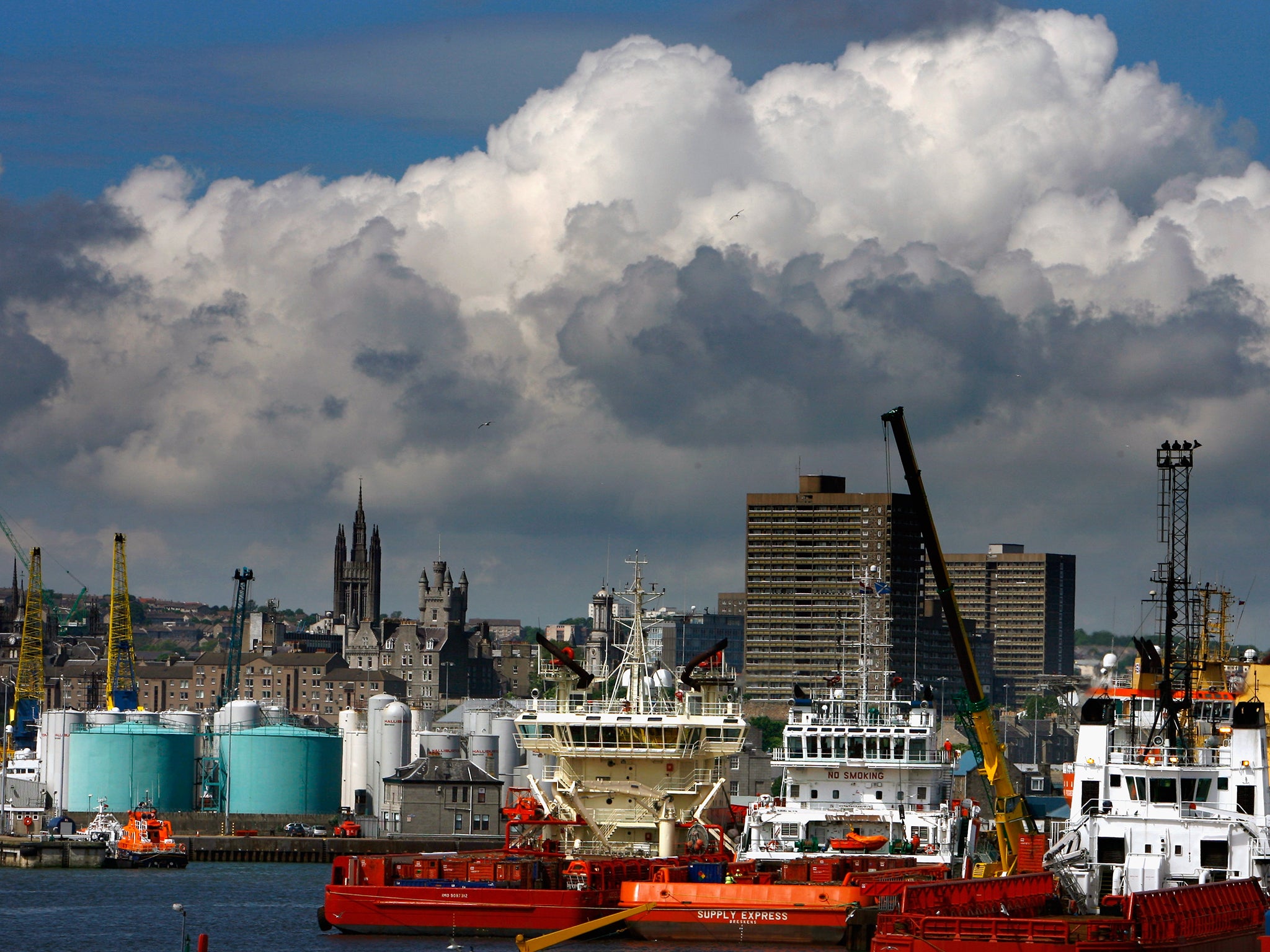Aberdeen feeling the pinch amid falling oil prices
130,000 in and around the city depend on the North Sea oil industry

Your support helps us to tell the story
From reproductive rights to climate change to Big Tech, The Independent is on the ground when the story is developing. Whether it's investigating the financials of Elon Musk's pro-Trump PAC or producing our latest documentary, 'The A Word', which shines a light on the American women fighting for reproductive rights, we know how important it is to parse out the facts from the messaging.
At such a critical moment in US history, we need reporters on the ground. Your donation allows us to keep sending journalists to speak to both sides of the story.
The Independent is trusted by Americans across the entire political spectrum. And unlike many other quality news outlets, we choose not to lock Americans out of our reporting and analysis with paywalls. We believe quality journalism should be available to everyone, paid for by those who can afford it.
Your support makes all the difference.Taxi driver Russell Whyte normally expects to be rushed off his feet ferrying oil rig workers to Aberdeen Airport, so they can catch the helicopter back to their oil rigs. This time, however, he spent a good part of the day reading his book.
“Normally it would have been non-stop but I spent five hours doing nothing,” Mr Whyte complained. “There’s a pessimism about the city, a down feeling – people are expecting layoffs and they are worried that worse is yet to come.”
Aberdeen’s heliport is the busiest in the world, and ferrying crews and oil executives to their flights is a lucrative trade for the city’s taxi drivers. How well they’re doing says a lot not just about the state of the North Sea oil industry, it also illustrates how important oil is for the entire city’s economy.
The signs aren’t good.
Mr Whyte says he and his colleagues have found business very slow of late, as companies mothball unprofitable rigs in the face of plunging oil prices. “Oil is Aberdeen and Aberdeen is the oil industry. Aberdeen has lived in a bubble because the industry has protected us through all types of down times that have affected others. But it looks like the bubble might burst.”

At the Broomfield Terminal, used for oil company charter flights to Shetland, the mood is also sombre. Huddled in a windswept smoking shelter opposite the terminal, a crew of workers waiting to fly to their rig fear for their future.
“Are we shitting ourselves about losing our jobs? Yes,” said Steve, a “rough neck”, or manual labourer, on the drill crew. “We’ve been told 120 are going in the next year but we’ve not been told who they are,” added one of his colleagues. “I was supposed to buy a house two months ago – I didn’t do it, thank God!” another chipped in.
Euan Sutherland, 21, a caterer and odd-jobs man on an offshore rig, is also concerned about the impact of the falling oil price, which has already caused hundreds of redundancies and threatens thousands more in Aberdeen’s oil-dominated economy.
“As an Aberdonian, I am scared to see the prospect of the city crumbling. It’s scary that everything here is based on the oil price – and a high oil price,” Mr Sutherland said. “My family are all in oil and they are used to ups and downs. But they are more scared than they usually would be.”
The oil industry in Aberdeen and the surrounding area employs 137,300 people – 23,500 directly, 82,000 in the supply chain and 31,800 “induced” jobs, generated by the spending of wages and profits, according to the Aberdeen City Council.
The North Sea industry has been hit particularly hard by the slide in the oil price, from $114 a barrel in July to about $50 now. This is because most of the remaining oil in the North Sea’s aging fields is difficult to access and costly to extract, much of it requires a price of $80 or more to make production economically viable.
Although the price is expected to eventually rebound, some analysts forecast it could go as low as $35 later this year before it does so. Moreover, when it finally does rise – and no-one knows when that will be – they doubt the price will reach the level seen last summer.
“There is a lot of gloom in Aberdeen because there has been a growing realisation in recent weeks that this isn’t just a blip,” said Professor Brian Ashcroft, of the University of Strathclyde.
While those connected to the industry are starting to feel a pinch they fear will only get worse, there is a sense that the rest of the city doesn’t yet know what’s about to hit it.

Some consumers and shopkeepers have noticed a decline in business and optimism, but for the most part they have discerned no significant change so far. Cameron Gilchrist, who works at a bakery in the West End of Aberdeen, said: “I haven’t really noticed any changes in customer behaviour, although I can imagine the anxiety of those people in the oil industry.”
Professor Alex Kemp, of Aberdeen University, said that most of the effects of the price fall have yet to be felt. “Existing fields will continue, though their lives may be shortened, but investment in new field developments and exploration will be hit and that will be felt as the year progresses,” he said.
Chancellor George Osborne has said that he is working towards a hefty tax cut in the forthcoming budget to help the industry, but even a huge cut would do little to help the struggling North Sea industry. With the oil price set to remain depressed for some time to come, Aberdeen feels a bit like a city with an axe hanging over its head.
Drinking in some of their favourite watering holes, some oil workers insist they are unconcerned about falling prices – in some cases because their rigs are fully-funded to operate for the next year or so.

Others are concerned for friends and relatives. At Aitchies, a popular oil worker pub opposite Aberdeen’s central railway station, Bob Johnston sits among a pile of kit bags belonging to offshore workers stopping in for a pint on their way to or from the rigs. “On a scale of one to 10, I’m concerned for myself about [level] two because I’ve been in the industry for a long time. But for my nephew, wanting to get into the oil industry, I’m an eight,” said Mr Johnston, an industry veteran of 28 years. “He’s not going to get in with this downturn. It has absolutely become harder to get into in the past six months.”
Across the road in the railway station pub, Cameron, an apprentice equipment technician, wishes that he had a few more years under his belt.
“People are getting nervous. There’s a sense that if this goes on for very much longer we’re probably going to get ditched. I’m pretty nervous because I’m not fully qualified,” he said. “I’ve been working for six months and people have got increasingly nervous over that time – thinking ‘maybe I should jump the boat before it sinks’.”
Join our commenting forum
Join thought-provoking conversations, follow other Independent readers and see their replies
Comments